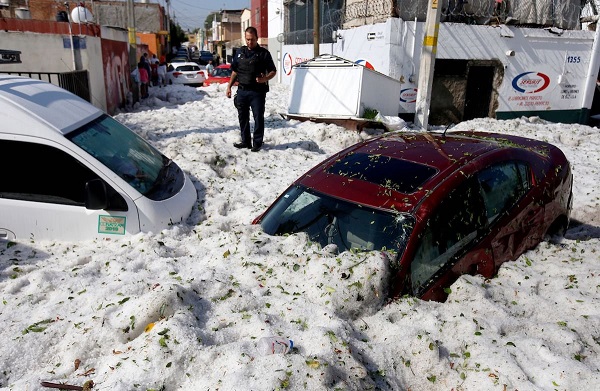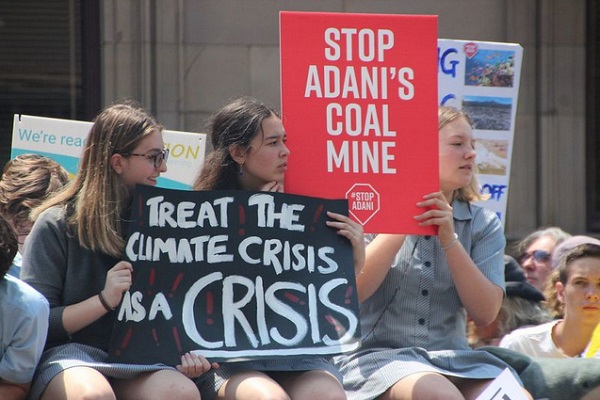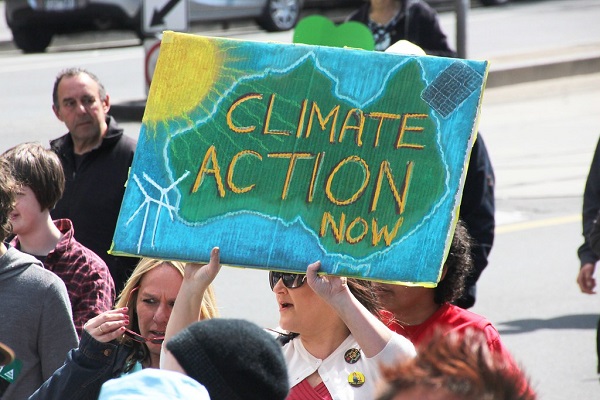
With France breaking heat records by nearly 2°C and 1.5 metres of hail fall on Guadalajara in Mexico, Australian blog Lethal Heating has been blogging a storm on the climate emergency. LH selects and republishes three articles per day, adding value by making some available that may be paywalled, and adding a list of links to relevant previously published articles.
Below I’ve linked to some recent articles.
1. When Alexandria Ocasio-Cortez Met Greta Thunberg: ‘Hope Is Contagious’
They met by video link because Greta Thunberg does not fly.

I liked this:
- …I learned that hope is not something that you have. Hope is something that you create, with your actions. Hope is something you have to manifest into the world, and once one person has hope, it can be contagious. Other people start acting in a way that has more hope.
Also this:
- Leadership is about taking decisions when you don’t know 100% what the outcome is going to be.
Both went through a period of depression and despair on their way to positive advocacy roles.
2. Climate Change Doomsday Report Predicts End Of Human Civilisation
This is a news.com.au article on David Spratt and Ian Dunlop’s report Existential climate-related security risk: A scenario approach with a foreword by retired Admiral Chris Barrie published separately at Climate Code Red. The prospects are grim:
- “More than a billion people may need to be relocated, and in high-end scenarios, the scale of destruction is beyond our capacity to model, with a high likelihood of human civilisation coming to an end,” Spratt and Dunlop warn.
By 2050, total ecological collapse would give way to massive social consequences ranging from “increased religious fervour to outright chaos”.
Sounds grim, but please note the word “may” in there. Dunlop wrote after the election in early June in the SMH Time To Flick Climate Emergency Switch: A Plea To Our New Parliament (that’s the LH version).
Dunlop says organisations representing 66 million people in 13 countries have adopted formal climate emergency resolutions. What matters is what these countries do more than what they say.
David Spratt is a science writer researching climate change research. Ian Dunlop is former chairman of the Australian Coal Association and chair of the Australian Greenhouse Office Experts Group on Emissions Trading. Together they have established an independent think tank Breakthrough (The National Centre for Climate Restoration).
3. No System Of Government Designed By Human Beings Can Survive What The Climate Crisis Will Bring
That’s an article from Esquire, which looks at the devastating drought on northern India.
Then it links to an article in Forbes We Have Five Years To Save Ourselves From Climate Change, Harvard Scientist Says>
The scientist is James Anderson, a Harvard University professor of atmospheric chemistry best known for establishing that chlorofluorocarbons were damaging the ozone layer. He said at the University of Chicago that people have the misapprehension that we can recover from this state just by reducing carbon emissions:
- Recovery is all but impossible, he argued, without a World War II-style transformation of industry—an acceleration of the effort to halt carbon pollution and remove it from the atmosphere, and a new effort to reflect sunlight away from the earth’s poles.
This has do be done, Anderson added, within the next five years.
One view, of course, but a scientist with some credibility. The UNFCCC which gave us the Paris Agreement in 2015 is still trying to figure out how to achieve zero emissions by 2050.
4. Rising Methane May Thwart Efforts To Avoid Catastrophic Climate Change
We need a drastic reconsideration of the role of gas in the energy system. A linked article was Burning the Gas ‘Bridge Fuel’ Myth: Why Gas Is Not Clean, Cheap, or Necessary.
5. Rising Seas Threaten Australia’s Major Airports – And It May Be Happening Faster Than We Think
This is an article by four risk scientists associated with Macquarie University. They say most of our major airports in Australia are located on reclaimed swamps, sitting only a few metres above sea level:
- In the US, the National Oceanic and Atmospheric Administration (NOAA) has recommended that global mean sea level rise of up to 2.7 metres this century should be considered in planning for coastal infrastructure. This is two to three times greater than the upper limit of recommended sea level rise projections applied in Australia.
Australian airports are using IPCC 2013 levels, which many scientists now think inadequate (always did, actually).
- While there are many uncertainties around the future cost of sea-level rise, a study by the Climate Council suggests over a metre sea level rise would put more than A$200 billion worth of Australian infrastructure at risk.
That study was published in 2014.
6. Political Change Is The First Step To Stopping The Climate Crisis

This is about a new book by Mike Berners-Lee and his thoughtful and stimulating new paperback, ‘There Is No Planet B’.
He’s keen on democracy, but:
- we have to rethink the whole basis of human behaviour. This means switching to vegetarian or vegan diets, abandoning plastic packaging and cutting down on air travel (powered by biofuels, if we must, but the biofuel business is lunacy – he uses the word “bonkers” – in energy terms).
But these are small things. The big and not necessarily entirely popular message of the book is that we must change politically. Free market capitalism or neoliberalism or any pursuit entirely and only for profit cannot deliver answers to the coming climate crisis.
He says there is plenty of clean energy available from the sun:
- The sun delivers around 16,300 kilowatts to the Earth’s surface for every person on the planet — enough, he says, to boil an Olympic-sized swimming pool of water for each and every one.
Solar panels that covered just 0.1% of the total land surface (think of a small country just 366 kilometres square) could meet all of today’s human energy needs.
Our problem is, he says, if there is more, we just want more.
7. Another world is possible
Indeed inevitable.
Berners-Lee provides food for thought, but speaking of the end of capitalism, Immanuel Wallerstein’s 500th and last commentary “This is the end; this is the beginning”. Wallerstein thinks capitalism has been in trouble since around 1968. So it is in transition, but will it transform into a new system? He sees the basic struggle as one of class, broadly defined. He reckons the chances of transformation are about 50-50.
I think capitalism will endure, but social democracy is the only alternative to barbarism. Capitalism needs to be domesticated, ie. regulated within and between nation states, or it will commercialise everything, including even the air available for breathing. International corporations and their role in trade agreements represent a special problem, especially investor-state provisions, which can over-rule national environmental laws, plus the commodification of human labor an ideological bias towards deregulation. Check out the Regional Comprehensive Economic Partnership, which involves 16 Asian countries plus Australia and NZ, is currently being negotiated in secrecy behind closed doors.
However, if we need to wait for all that to resolve itself, we are toast.

Update:
Thinking about this today, I’m not happy with Mike Berners-Lee’s pessimistic view of human nature. As humans we are capable of moderation as an aspiration, rather than pigging out because we can. So there is no reason why we should not enjoy a future of energy plenty provided by the sun.
If we need to change, it is from the individual pursuit of happiness as a direct primary personal goal to an orientation infused with compassion, and how we can assist others to a fuller, richer life.
Noteworthy that today’s offering from Lethal Heat includes It’s Time To Change The Climate Disaster Script. People Need Hope That Things Can Change by communications strategist Nicky Hawkins:
- Stating loudly that problems exist and have reached crisis point does not help us to move beyond said crises, especially if they are hard to understand and tough to tackle.
The stories we hear and tell matter. They shape how we understand the world and our part within it.
And:
- Research is clear that to overcome fatalism and inspire change we must balance talk of urgency with talk of efficacy – the ability to get a job done. Too little urgency and “why bother?” is the default response. Too much crisis and we become overwhelmed, fatalistic or disbelieving – or a disjointed mixture of all three, which is where most of us get stuck when anyone talks about climate change.
I want to do a couple more climate science posts, then some more positive ones again on climate action.


I’ve added an update:
Thinking about this today, I’m not happy with Mike Berners-Lee’s pessimistic view of human nature. As humans we are capable of moderation as an aspiration, rather than pigging out because we can. So there is no reason why we should not enjoy a future of energy plenty provided by the sun.
If we need to change, it is from the individual pursuit of happiness as a direct primary personal goal to an orientation infused with compassion, and how we can assist others to a fuller, richer life.
Noteworthy that today’s offering from Lethal Heat includes It’s Time To Change The Climate Disaster Script. People Need Hope That Things Can Change by communications strategist Nicky Hawkins:
Stating loudly that problems exist and have reached crisis point does not help us to move beyond said crises, especially if they are hard to understand and tough to tackle.
The stories we hear and tell matter. They shape how we understand the world and our part within it.
And:
Research is clear that to overcome fatalism and inspire change we must balance talk of urgency with talk of efficacy – the ability to get a job done. Too little urgency and “why bother?” is the default response. Too much crisis and we become overwhelmed, fatalistic or disbelieving – or a disjointed mixture of all three, which is where most of us get stuck when anyone talks about climate change.
I want to do a couple more climate science posts, then some more positive ones again on climate action.
I’ve just read the chapter in Mary Robinson’s book Climate Justice: Hope, Resilience, and the Fight for a Sustainable Future where she writes about Anote Tong, who was president of Kiribati for three terms.
He read about climate change in the 2007 IPCC report, and worried, because the forecast sea level rise of up to one metre by 2100 would destroy the country. It tells how he campaigned for a 1.5°C limit, believing that might save them, but was dudded at Copenhagen in 2009, as the developed countries were willing to sacrifice small island states as collateral.
He hadn’t told the people, because he did not want to trouble them.
After Copenhagen he felt he had to, so that they could work on a plan B, which is another story, and he continues to work on it after his term expired..
I liked what he said at the end:
I think we need to plan and hope for the best, and have a plan B for the worst, especially with things like SLR.
Brian: It is easy to drift towards becoming a SUMWUN culture over climate action. A culture where we will all be RUNED unless SUMWUN other than ourselves does something, even when we are the ones who really have the power to make change happen.
There are lots of things individuals and communities can and are doing as part of the climate action. Ditto the various levels of government and private enterprise.
How about a bit of cheer leading and a post on what tangible action is/has taken place to date and what action is getting close to action in the future?
John, I’m not a natural cheerleader, but by and by I hope to get back to a posts “on what tangible action is/has taken place to date and what action is getting close to action in the future?”
I’ve got a few leads on what would make a substantial difference.
On the SUMWUN syndrome, Mary Robinson’s next chapter was on one such who talked the talk with others, but was in the ‘aggressive skin care business’ which absorbed most of her time. Through self-reflection this apparently changed.
Every bit helps.
Brian: The SUMWUN culture is a real problem in Aboriginal affairs because too many Aborigines have been convinced that someone else has the power to fix their problems. My take is that it is the Aborigines themselves who are the only ones with the power to solve their problems. What I liked about the Warindilyagwa people was that they did have the get up and go to make things happen that they thought were important.